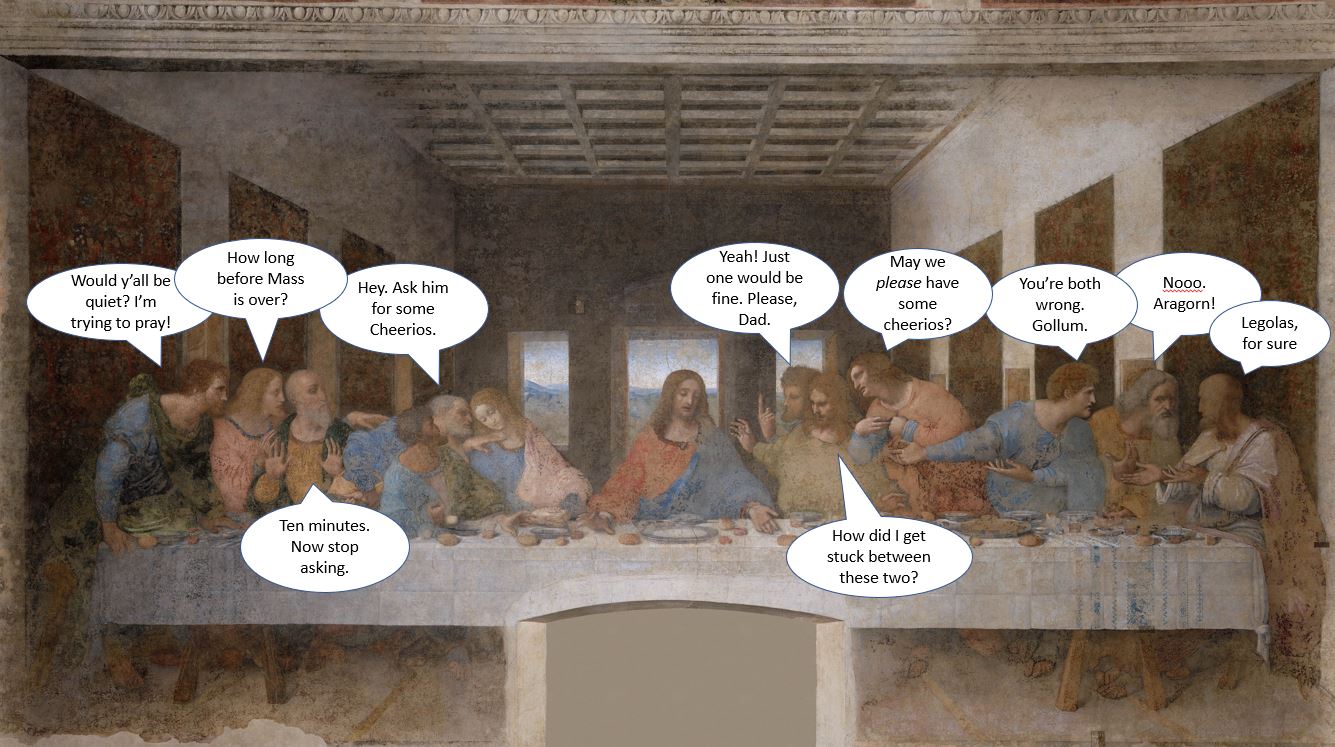This past summer, I was out early one Saturday morning performing that sacred weekend ritual: cutting the grass.
This year’s ritual has taken a backseat thanks to a dearth of rainfall and scorching heat. What was once green has retreated into tans and browns, so I invested in two sprinklers to restore our lawn’s vitality. It has worked… somewhat. What was brown has remained brown, and what was green now grows like gangbusters.
There is a lesser-known ritual that I perform during this time as well: removing the leaf and grass-clipping debris from the curb in front of our home. It builds slowly and doesn’t need to be addressed but two or three times per year. My four-year-old son was helping me in his own way, and as I used the spade to remove the large piles he had swept, I found I was leaving behind a great deal of dirt, small rocks, and generic road debris.
I thought, “No big deal, I’ll just leave it there.” The excuses began to rattle off quickly. We’ve all been there before. At least, I have. I told myself that what we were removing was already a big improvement, and I didn’t need to worry about such trifling things as dust and pebbles. I told myself that the Houston heat was about to impose its tyranny, and what would I gain by standing in it for an extra 5 – 10 minutes anyway? Best of all, I told myself, “Everyone else has debris in front of their homes, too.” No… really.
Creeping Low Expectations
People love talking about slippery slopes. We encounter them frequently in all walks of life. Our political, social, and economic climates exacerbate these slopes to the point of being ludicrous. The old adage, “Give an inch, take a mile,” is as pervasive now as it has ever been.
I mulled over my situation, scraping away at the pavement as my son chattered about how many leaves he was raking.
My son! The poor boy. Here is an opportunity: let me show him that a few extra beads of sweat are OK.
Parenting brings a return to naturalness (via our kids) that we fight most of our adult lives. As we age and grow into our own unique person, we develop sensibilities and proclivities that add to our mysteriousness. Put another way, getting older complicates us. One’s own docility is a good indicator of how amenable they may be to rediscovering that naturalness.
And I am, of course, speaking of our own childlike tendencies.
As a boy, I know it must have been hot during the summer. I intuit this when I look at pictures of me wearing a heavy, scratchy baseball uniform – cheeks flushed red and dripping sweat.
Yet I don’t recall ever complaining about the heat. We’re all robustly honest when it comes to irritation. Adults and children alike, we are often more than happy to share our misery. So why don’t I remember? Well, it’s probably one of two reasons:
First: I don’t remember much of anything I said in my youth. This is compelling. Looking beyond that, however, I remember certain feelings from my youth. The feelings associated with the suffering I experienced are not linked directly or seemingly remotely to my physical environment. That’s a story for another day, though.
Second: I didn’t complain. This is also compelling since it was a different era. One that preceded smartphones and an inordinate emphasis on electronic media. You didn’t play inside unless it was raining, and even then…
Thanks, God
In my fit of nostalgia, I’ve lost the thread. Let me go find it again.
Naturalness is a gift granted to us by God. It was first presented to Adam and Eve in the Garden, and we are all familiar with those pre-Fall images of our first parents. Implicitly, we know they are naked, as the artist had to obstruct our view of their sensitive regions through clever use of shrub, branch, or wildlife.
Post-Fall, we see they are bound in clothes of their own design. The simplicity of their relationship with God has been complicated. Like us as adults, they have come to know too much of this world and sacrificed their childlike innocence in the process. What a sacrifice to make! Don’t just take my word for it. At the beginning of Chapter 18 of Matthew’s gospel, our Blessed Lord makes it quite clear: If we want the joys of Heaven, we must be like children.
As I watched my son prattle on about leaves and rocks and dirt, sweat beginning to form in his white-hot blonde hair, I realized how I am too much of an adult to be a decent parent. What would you have me do, son? Here he was, celebrating how big he was making his pile with nary a word regarding the budding heat. Meanwhile, I was (and am constantly) looking for ways to make my own pile smaller.
Such is the curse of aging: there is always something else to be done. Another chore, another meal, another call. Cut this one short to handle the next. Cut that one short for the sake of efficiency. Check it off the list. Burn it at both ends.
Wasting Time
A child, however, can patiently gather hundreds of fallen pecans over the course of a day without giving it a second thought. They do it well without our interference, thanks in large part to that sweet naturalness I’ve mentioned so many times now. It’s we who come in and, like a bull in a china shop, wreck their delicate demeanors.
Before I proceed – it’s an entirely different topic, and one which won’t be entertained today, to discuss the proper rearing of children. There is a necessity in aging, too, and in doing away with the things of childhood, as St. Paul writes. I’m not advocating for children to be their own masters. Far from it! That doesn’t mean that I can’t learn from them.
At this point in our story, from the moment my effort began to wane to the point in which I realized I should set a good example for my son to the proceeding thoughts, a scarce few seconds have elapsed. Can we take a moment to appreciate the benevolence of God our Father, who has granted us a supremely powerful intellect capable of drawing on a lifetime of experience to weigh multiple options in a few moments? Thank you, Lord.
Removing the debris was the only real choice, and my shovel could not do the job on its own. I was leaving too much behind. Even my son’s sweeping, while admirable, was generally ineffective. What this called for was modern machinery. Together, we walked to the garage to retrieve the leaf blower.
Big Guns
It wouldn’t be perfect, but it would break up the caked-on dirt and allow us to excise most of the debris. Like sin, however, we would not be able to make a clean break. The residue would remain – stains, deeply embedded rock and dust so minute that only a good washing and scrubbing would be able to break it free. Even then, scars from years of exposure – even scars from the act of cleaning the debris – would leave their mark.
This is no different from our reality as Christians. By the grace of God, we have the Sacrament of Reconciliation – a great renewal for our souls. But that concupiscence is a real devil to shake. The scars of sin persist, and to remove them takes serious effort – an effort we are not often willing to exert over long periods of time because the reward is not obvious, nor is it quick.
Daily, we wage war with ourselves and the creeping tendrils of sin. Let there be no armistice. The only victory is complete, but as Saint Josemaria tells us in a homily on human virtues,
“It is true that in themselves such personal qualities are not enough, for no one is saved without the grace of Christ. But if a man fosters and cultivates the seeds of virtue within him, God will smooth out his path, and such a person will be able to become holy because he has known how to live as a man of good will.”
Such a statement leaves open an intriguing possibility: virtue is not something we necessarily obtain in our time on Earth. Rather, in our endeavor to cultivate virtue, God sees fit through his love and mercy to make the suffering of such efforts not only tolerable but desirable. In a prayer commonly uttered by those seeking to develop a holy purity, we ask the Blessed Mary to “instill into us at the hour of our death the sweetness of divine love, that all bitterness at that time may become acceptable and pleasant to us.”
Returning to my son, he is not yet grown enough to understand suffering beyond the immediacy of what he does or does not like. For the time being, he is content to live as God had intended: a child discovering the newness of each day. He doesn’t yet know how to offer it up consciously, as we adults do, only naturally. He, better than I, understands what it means to go to war. A child is never satisfied until they have gained fully their heart’s desire.
Let us be like children! Let us seek ardently and with all the naturalness of an individual who embraces their divine filiation our heart’s truest and most complete desire: to know, love, and serve God.






